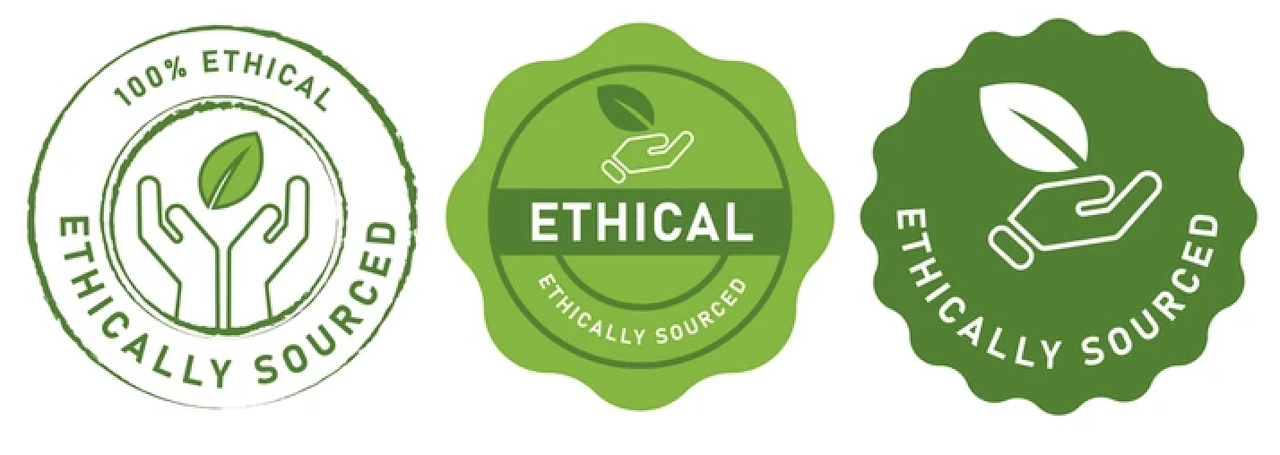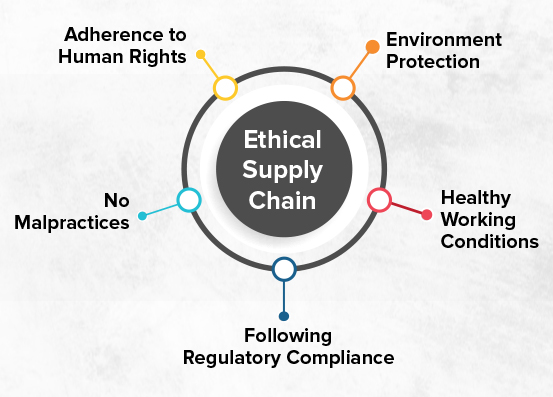Ethical and Sustainable Supply Chains: Paving the Way for a Better Future
In today’s rapidly evolving business landscape, ethics and sustainability are no longer optional components but essential principles for success. As the world becomes increasingly aware of environmental and social issues, ethical and sustainable supply chains have emerged as a critical focus for businesses aiming to not only boost their bottom line but also contribute positively to the planet and society.
In this article, we’ll dive into the importance of ethical supply chains, how they differ from traditional models, and why adopting sustainable practices is essential for long-term success. We will also highlight real-world examples and explore the future of sustainable supply chain management.

What are Ethical and Sustainable Supply Chains?
An ethical supply chain refers to the system in which companies source materials and goods while adhering to moral principles. These principles include ensuring fair labor practices, transparency, and environmental responsibility at every stage of the supply chain. On the other hand, sustainable supply chains focus on minimizing environmental impact, reducing carbon footprints, and using resources in a way that preserves them for future generations.
Key Elements of Ethical Supply Chains:
- Fair Labor Practices: Ensuring workers are treated with respect and paid fairly.
- Transparency: Open communication about sourcing, processes, and business practices.
- Environmental Stewardship: Reducing the negative environmental impact of operations.
- Supply Chain Accountability: Holding all partners accountable for their actions.
Key Elements of Sustainable Supply Chains:
- Waste Reduction: Minimizing waste at every stage of production and distribution.
- Energy Efficiency: Using renewable energy and optimizing energy usage in production.
- Circular Economy Practices: Reusing, recycling, and reducing the consumption of non-renewable resources.
The Growing Demand for Ethical and Sustainable Practices
Consumers, investors, and governments are demanding greater accountability from businesses. This shift is primarily driven by the following factors:
- Rising Consumer Awareness: People are more informed than ever about the ethical implications of their purchasing decisions. They are increasingly supporting brands that align with their values, especially when it comes to issues like climate change, human rights, and fair trade.
- Investor Pressure: Investors are prioritizing companies with sustainable practices, as these businesses tend to perform better in the long run. In fact, Environmental, Social, and Governance (ESG) criteria are becoming key decision-making factors for investment.
- Regulatory Requirements: Governments worldwide are tightening regulations surrounding environmental standards, labor practices, and sustainability reporting. Companies need to comply with these regulations to avoid penalties and maintain their licenses to operate.
How Sustainable Practices Benefit Businesses:
- Improved Brand Image: Ethical practices enhance reputation and foster customer loyalty.
- Cost Savings: Reducing waste and optimizing resources leads to cost reductions in the long term.
- Increased Market Share: Consumers are more likely to choose companies that reflect their values.
- Risk Mitigation: Ethical and sustainable practices help mitigate potential risks, such as regulatory fines or reputational damage.
Key Challenges in Building Ethical and Sustainable Supply Chains
While the benefits are clear, there are several challenges that companies face when trying to build ethical and sustainable supply chains:
- Complexity of Global Supply Chains: With a global network of suppliers and distributors, it’s difficult to ensure that every step of the supply chain aligns with ethical standards.
- High Initial Costs: Implementing sustainable practices, such as green manufacturing or certifications, can require significant upfront investment.
- Lack of Transparency: Many supply chains lack the transparency needed to track the source and journey of products from raw materials to the end consumer.
- Resistance to Change: Some companies may resist changing their existing supply chain models due to the perceived risks and costs involved.
Overcoming These Challenges
Businesses can tackle these challenges by:
– Conducting thorough audits of their supply chains to identify areas that need improvement.
– Investing in technology like blockchain to ensure transparency and traceability.
– Building partnerships with suppliers who share the same ethical and sustainable values.
– Educating stakeholders about the long-term benefits of adopting ethical practices.

How to Build an Ethical and Sustainable Supply Chain
Creating an ethical and sustainable supply chain is a step-by-step process. Below, we outline the essential strategies for building a resilient and responsible supply chain:
1. Choose Sustainable Suppliers
The foundation of any ethical supply chain is the careful selection of suppliers who align with your values. This means sourcing from companies that prioritize fair wages, safe working conditions, and environmental responsibility.
- Example: Patagonia, a brand known for its environmental activism, works exclusively with suppliers who meet strict sustainability criteria and adhere to its Fair Trade certification.
2. Ensure Fair Labor Practices
It’s essential that workers across your supply chain are treated ethically. This includes providing fair wages, good working conditions, and ensuring workers’ rights are respected.
- Example: Nike has taken significant steps to address labor practices in its supply chain by partnering with independent organizations to conduct regular audits and improve working conditions in factories.
3. Utilize Technology for Traceability and Transparency
Blockchain technology has proven to be a game-changer for supply chain transparency. It allows companies to track every step of the supply chain in real-time, ensuring that products are sourced responsibly.
- Example: Companies like Walmart and IBM have implemented blockchain technology to improve traceability and accountability in their supply chains, particularly in the food industry.
4. Adopt Circular Economy Practices
A circular economy is based on the idea of reducing waste, reusing resources, and recycling materials. Companies should aim to design products with longevity in mind, minimize waste, and recycle materials whenever possible.
- Example: Ikea has committed to using 100% sustainable materials and reducing its carbon footprint by adopting circular design principles, such as designing furniture that can be easily disassembled and recycled.
5. Engage with Stakeholders and Communicate Results
Transparency is key to an ethical and sustainable supply chain. Communicate your efforts to all stakeholders, including customers, employees, and investors, to show your commitment to sustainability and ethical practices.
- Example: Unilever shares annual sustainability reports detailing its progress towards ethical sourcing, reducing environmental impact, and improving social welfare across its supply chain.
Real-World Examples of Ethical Supply Chains
1. Starbucks
Starbucks has been a pioneer in promoting ethical sourcing, especially in its coffee supply chain. Through its Coffee and Farmer Equity (C.A.F.E.) practices, Starbucks ensures that the coffee it sources is grown sustainably and that farmers receive fair prices.
2. Tesla
Tesla’s commitment to sustainable supply chains is reflected in its electric vehicles, which rely on ethically sourced materials such as cobalt, lithium, and nickel. The company has made strides to ensure that its suppliers meet strict ethical standards and environmental regulations.
3. Ben & Jerry’s
Ben & Jerry’s, the ice cream company, has long been committed to social and environmental responsibility. The company sources ingredients from Fairtrade-certified suppliers and supports environmentally friendly farming practices to ensure its supply chain is both ethical and sustainable.
Frequently Asked Questions (FAQs)
1. What are the key benefits of an ethical and sustainable supply chain?
- Improved brand image and customer loyalty
- Cost reductions from energy efficiency and waste management
- Risk mitigation from avoiding unethical practices
- Increased market share by aligning with consumer values
2. How can technology improve supply chain sustainability?
Technology, especially blockchain, can increase transparency and traceability, helping companies verify the origins of materials, monitor environmental impact, and ensure ethical labor practices throughout the supply chain.
3. How do ethical and sustainable supply chains impact a company’s bottom line?
While there may be upfront costs involved in implementing sustainable practices, companies see long-term cost savings, enhanced brand value, and increased customer loyalty, which ultimately improve profitability.
4. Is adopting a sustainable supply chain more expensive?
Although the initial investment can be higher, companies often find that the long-term benefits, including operational efficiencies and a stronger brand reputation, far outweigh the initial costs.
The Future of Ethical and Sustainable Supply Chains
The future of ethical and sustainable supply chains is incredibly promising. With consumers demanding more transparency, governments enforcing stricter regulations, and businesses recognizing the long-term value of sustainability, the shift toward ethical practices will continue to accelerate.
By making ethical supply chains a central component of their business strategy, companies can not only enhance their profitability but also contribute to a better world for future generations.
For more information on ethical and sustainable practices, visit 3SC Solution or explore LinkedIn Articles to discover success stories from leading brands.

Conclusion
In conclusion, ethical and sustainable supply chains are no longer just a trend but a business imperative. Companies that prioritize these principles are not only contributing to the well-being of the planet and society but are also positioning themselves for long-term success in an increasingly conscious and competitive marketplace. By embracing these practices, businesses can create a positive impact, foster consumer trust, and ensure their own growth in a sustainable future.

